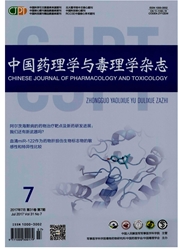

 中文摘要:
中文摘要:
目的研究中药五味子的木脂素类成分五味子醇甲(SCH)的抗抑郁作用及其机制。方法小鼠单次ig给予SCH 5,10和30 mg·kg-1后1 h,采用小鼠悬尾实验和强迫游泳实验评价其抗抑郁活性;采用自发活动实验评价其对中枢兴奋性的影响;采用利血平拮抗实验和育亨宾毒性实验评价其对中枢单胺神经功能的影响。结果在行为绝望模型中,与正常对照组相比,SCH 30 mg·kg-1可显著缩短小鼠悬尾和强迫游泳的不动时间(P〈0.05);自发活动实验结果显示,SCH在受试剂量范围内对中枢神经系统无兴奋或抑制作用;在利血平拮抗实验中,与模型组相比,SCH 30 mg·kg-1可拮抗利血平(2.5 mg·kg-1,ip)引起的小鼠眼睑下垂和运动不能(P〈0.05),对肛温下降无显著影响;在育亨宾毒性实验中,SCH各剂量对育亨宾阈致死剂量(30 mg·kg-1,sc)引起的小鼠死亡率无显著影响。结论 SCH具有潜在的抗抑郁药理活性。
 英文摘要:
英文摘要:
OBJECTIVE To explore the antidepressant effect and the underlying mechanisms of schisandrin(SCH), a component of the fruits of Schizandra chinesis. METHODS The forced swimming test(FST) and tail suspension test(TST) in mice were used to evaluate the antidepressant activity of SCH(5, 10, and 30 mg·kg-1) following single administration intragastrically, and the locomotor activity was investigated to exclude its neural excitatory effects. Effects of SCH on neural monoamine systems were studied in two pharmacological models, including reserpine induced monoamine depletion test and yohimbine toxicity potentiation test. RESULTS In behavioral despair models, SCH(30 mg·kg-1) significantly decreased the immobility time in the TST and FST(P〈0.05) compared with normal control group.Results of the locomotor activity experiment showed that SCH had no excitatory or inhibitory actions on the central nervous system. In the reserpine reversal experiment, SCH(30 mg·kg-1) antagonized the palpebral ptosis and akinesia symptoms caused by reserpine(2.5 mg·kg-1) treatment(P〈0.05) compared with model group, but had little effect on the drop of the anal temperature. Moreover, SCH did not increase the lethality caused by subcutaneous injection of yohimbine(30 mg·kg-1)at the threshold lethal dosage.CONCLUSION SCH exerts potential antidepressant-like effect in mice.
 同期刊论文项目
同期刊论文项目
 同项目期刊论文
同项目期刊论文
 期刊信息
期刊信息
